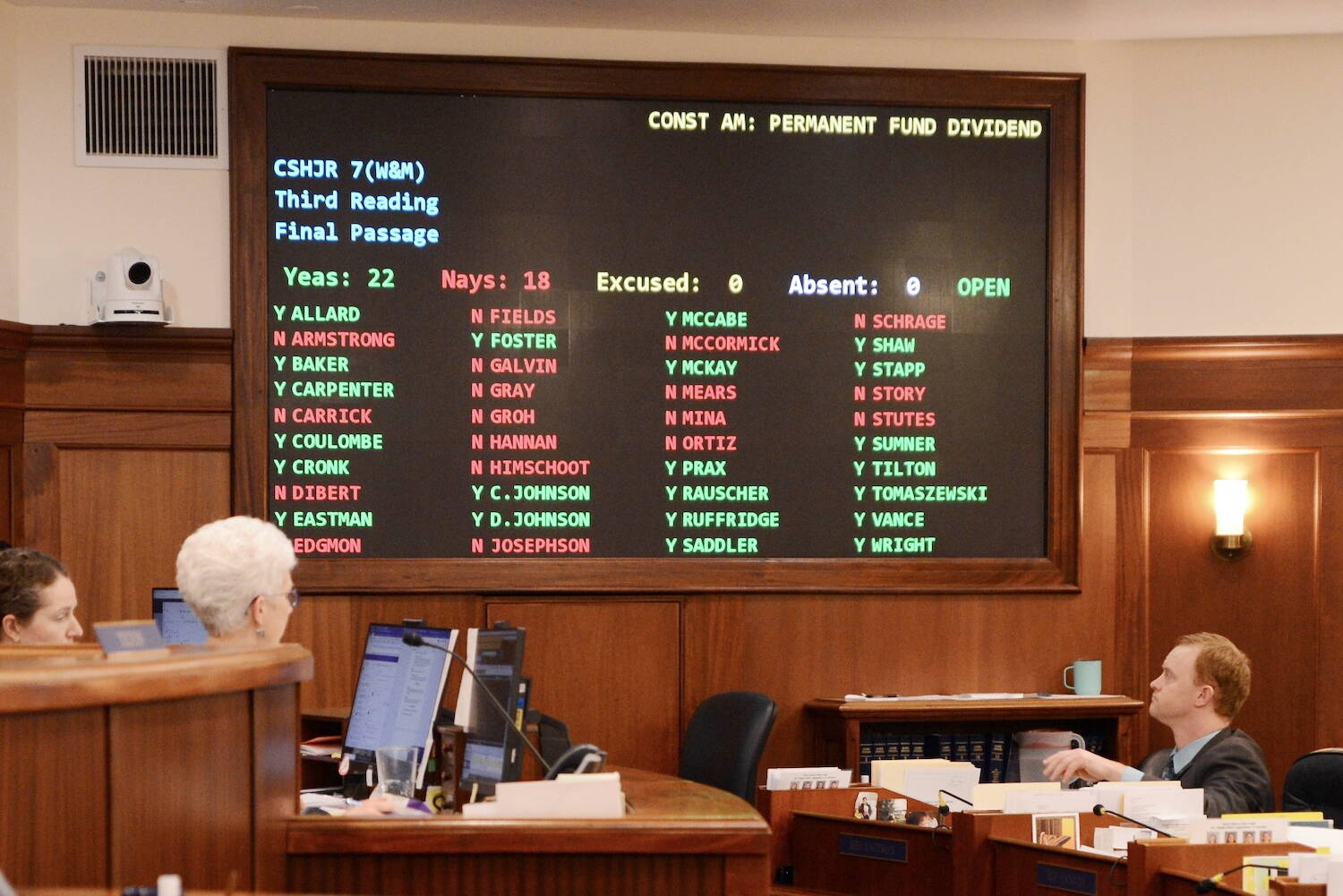Correction: This article has been updated to reflect the fact that both tax bills have been the subject of hearings in the House Ways and Means Committee.
The Alaska House of Representatives on Thursday rejected a long-awaited constitutional amendment that would have guaranteed payment of the annual Permanent Fund dividend.
The final vote was 22-18, five votes short of the supermajority required to advance the amendment to the Senate for further debate.
The amendment was part of a plan created in 2021 by a bipartisan, bicameral working group after the state came within a week of a government shutdown due to disputes over the size of the dividend.
Rep. Ben Carpenter, R-Nikiski, was a member of the working group and is the author of the amendment. He said Thursday’s failed vote doesn’t mean the end of the end of the plan envisioned by the working group.
“There’s enough people who want to see something happen,” he said.
“We’ll just regroup,” Carpenter said.
From 1982 through 2015, the size of the dividend was set by a formula in state law. In 2016, amid falling oil revenue, then-Gov. Bill Walker vetoed half the dividend to balance the state budget.
After a subsequent lawsuit, the Alaska Supreme Court ruled that the dividend is subject to the state’s annual budget process, even though the traditional formula remains in state law.
“Absent another constitutional amendment, the Permanent Fund dividend program must compete for annual legislative funding just as other state programs,” Supreme Court Justice Daniel Winfree wrote at the time.
Every year since that decision, the Alaska Legislature has set the dividend by fiat, and debates over the dividend’s proper size have repeatedly brought the state to the brink of a government shutdown.
House Joint Resolution 7, written by Carpenter, would require the state — starting in 2025 — to pay a Permanent Fund dividend “according to a formula set out in law.”
The problem with that idea, said Rep. Andy Josephson, D-Anchorage and one of its most vocal opponents, is that the current formula in state law would create a deficit of more than $1.5 billion.
This year, for example, the traditional formula calls for a roughly $3,500 dividend that would cost $2.27 billion. That’s more than 50% above the $2,270 dividend proposed by the House in its latest budget draft, which has been attacked as unaffordable.
“We already know that’s not going to happen,” said Rep. Zack Fields, D-Anchorage, of the House’s proposed budgetary dividend.
Carpenter and other supporters of the amendment responded to Josephson’s criticism by saying that nothing prevents the Legislature from simply changing the formula in state law.
After Josephson said there were zero signs that the Legislature would be willing to do that — or that Gov. Mike Dunleavy would allow it to happen — members of the House voted 37-3 to discharge a proposed formula change from the House Finance Committee without a hearing, bringing it one step closer to a vote.
That’s an unusual step, and it leaves Senate Bill 107, the formula change, awaiting scheduling for a vote of the full House.
As currently written, that bill proposes a so-called “50-50 dividend” worth $1.83 billion this year.
Rep. Sarah Vance, R-Homer and a supporter of the amendment, urged her fellow lawmakers to have “faith” that the Legislature will be able to change the dividend formula, and Rep. Craig Johnson, R-Anchorage, said that passage of the amendment would be a spur to action.
“All this bill does is it forces us to make a decision,” he said.
“What this comes down to for me is trust,” said Rep. Justin Ruffridge, R-Soldotna and a supporter of the amendment. “I think there is a lack of trust … about whether or not we can actually pass all of the pieces that go along with this piece for a fiscal plan.”
Many House Democrats said they don’t believe Republican lawmakers are willing to vote for taxes that would be needed to hold spending on services flat while also paying for a dividend like the one envisioned by Senate Bill 107.
Democrats weren’t alone in raising those concerns. Rep. Will Stapp, R-Fairbanks, voted in favor of the amendment but warned about the costs.
“The only way that’s sustainable is if you tax people — and oil companies too — or massively cut government spending,” he said.
In a pair of parliamentary maneuvers, Reps. Alyse Galvin, I-Anchorage, and Andrew Gray, D-Anchorage, attempted to advance an income tax bill and a sales tax bill, respectively, to the House Finance Committee. Both bills have received hearings in the House Ways and Means Committee, but they haven’t been released from that committee.
Galvin’s motion, dealing with House Bill 156, failed by a 20-20 vote, one short of what was needed. Gray’s motion, dealing with House Bill 142 — written by Carpenter — failed 17-23.
Afterward, Rep. Donna Mears, D-Anchorage, said that the failed votes reinforced why there’s a lack of trust about the dividend amendment.
“This resolution no longer has my vote,” she said.
• James Brooks is a longtime Alaska reporter, having previously worked at the Anchorage Daily News, Juneau Empire, Kodiak Mirror and Fairbanks Daily News-Miner. This article originally appeared online at alaskabeacon.com. Alaska Beacon, an affiliate of States Newsroom, is an independent, nonpartisan news organization focused on connecting Alaskans to their state government.

